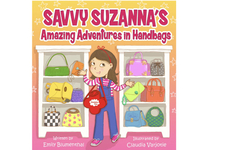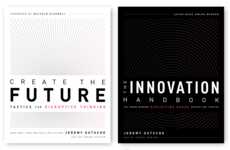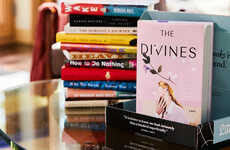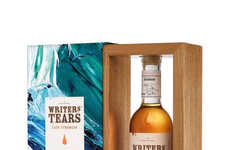
Tisah Tucknott — August 22, 2009 — Business
References: wilbursmithbooks
Wilbur Smith was born and raised in Central Africa as a trouble-making child with a slingshot. After graduating from Rhodes University, in Grahamstown, South Africa, Wilbur announced to his father that he wanted to become a journalist, to which his father answered: “You’ll starve to death. Go and find yourself a real job.”
Despite his father's doubt, Wilbur Smith has gone on to become one of the best and much-admired writers in the world. We recently talked with Wilbur about the role that trends and innovation play in his work.
13 Questions with Wilbur Smith
1. How do you keep your work on the cutting edge?
I have a deep and intense belief that what I do is of paramount importance to myself and my loyal readers. I try not to allow myself to fall below the standards I have set [for] myself.
2. How do you reset yourself to become creative? Do you have any rituals?
I live within the body of my work. Not a day passes that I do not ponder what I have already done and how I can improve upon that in the future.
3. What is an example of a time where you have thrown away an existing idea to force yourself to find something new?
I discard innumerable ideas in the build-up to beginning a new novel.
4. How did you get involved in writing and what motivates you to continue?
Creative writing is probably the only thing that has ever truly excited and obsessed me. The success that has rewarded my efforts over the last forty five years has been my spur.
5. How significant are the topics of cool hunting and trend spotting in the world of writing?
To me they are entirely insignificant. I do not follow trends. I strive to follow the path less trod.
6. How do you define a trend?
A trend is a stampede of imitators after something from which somebody else has already skimmed the cream. It is like me setting out to write a Harry Potter series. A lovely lady named J.K. Rowling has been there before me.
7. How do you define cool?
Cool is a descriptive word I usually apply to the weather or wine.
8. Do you need a culture of innovation to create something that is cool?
Innovation is not following a trend; it involves breaking the mold.
9. What is the best way to create an infectious idea, product or service?
To dream up something of truth and value.
10. What is the key to innovation?
Thought and deep reflection.
11. What are the most important trends you see in the writing industry?
I shudder to hear myself described as part of an industry. I tell stories which make many people laugh and cry; stories that lift them out of their work-a-day existence. Stories which I believe in, and which satisfy my creative urge.
12. Professionally, what do you want to be doing or studying in 10 years?
I want to be doing what I do now, only doing it ever more skillfully.
13. What are your most important hobbies?
Reading and writing.
Despite his father's doubt, Wilbur Smith has gone on to become one of the best and much-admired writers in the world. We recently talked with Wilbur about the role that trends and innovation play in his work.
13 Questions with Wilbur Smith
1. How do you keep your work on the cutting edge?
I have a deep and intense belief that what I do is of paramount importance to myself and my loyal readers. I try not to allow myself to fall below the standards I have set [for] myself.
2. How do you reset yourself to become creative? Do you have any rituals?
I live within the body of my work. Not a day passes that I do not ponder what I have already done and how I can improve upon that in the future.
3. What is an example of a time where you have thrown away an existing idea to force yourself to find something new?
I discard innumerable ideas in the build-up to beginning a new novel.
4. How did you get involved in writing and what motivates you to continue?
Creative writing is probably the only thing that has ever truly excited and obsessed me. The success that has rewarded my efforts over the last forty five years has been my spur.
5. How significant are the topics of cool hunting and trend spotting in the world of writing?
To me they are entirely insignificant. I do not follow trends. I strive to follow the path less trod.
6. How do you define a trend?
A trend is a stampede of imitators after something from which somebody else has already skimmed the cream. It is like me setting out to write a Harry Potter series. A lovely lady named J.K. Rowling has been there before me.
7. How do you define cool?
Cool is a descriptive word I usually apply to the weather or wine.
8. Do you need a culture of innovation to create something that is cool?
Innovation is not following a trend; it involves breaking the mold.
9. What is the best way to create an infectious idea, product or service?
To dream up something of truth and value.
10. What is the key to innovation?
Thought and deep reflection.
11. What are the most important trends you see in the writing industry?
I shudder to hear myself described as part of an industry. I tell stories which make many people laugh and cry; stories that lift them out of their work-a-day existence. Stories which I believe in, and which satisfy my creative urge.
12. Professionally, what do you want to be doing or studying in 10 years?
I want to be doing what I do now, only doing it ever more skillfully.
13. What are your most important hobbies?
Reading and writing.
Trend Themes
1. Paramount Importance in Work - Identifying trends that prioritize the importance of their work and ensuring excellence in their field.
2. Breaking Mold Innovation - Pursuing disruptive innovation that breaks away from trends and creates new paths.
3. Infectious Ideas and Products - Creating ideas, products, or services that are compelling, valuable, and resonate with authenticity.
Industry Implications
1. Writing Industry - Exploring trends and innovations in the writing industry to enhance storytelling and creative output.
2. Publishing Industry - Looking for disruptive innovation opportunities in the publishing industry to revolutionize book publishing and distribution.
3. Creative Arts Industry - Finding trends and innovations in the creative arts industry that foster new forms of expression and engagement.
2.2
Score
Popularity
Activity
Freshness























